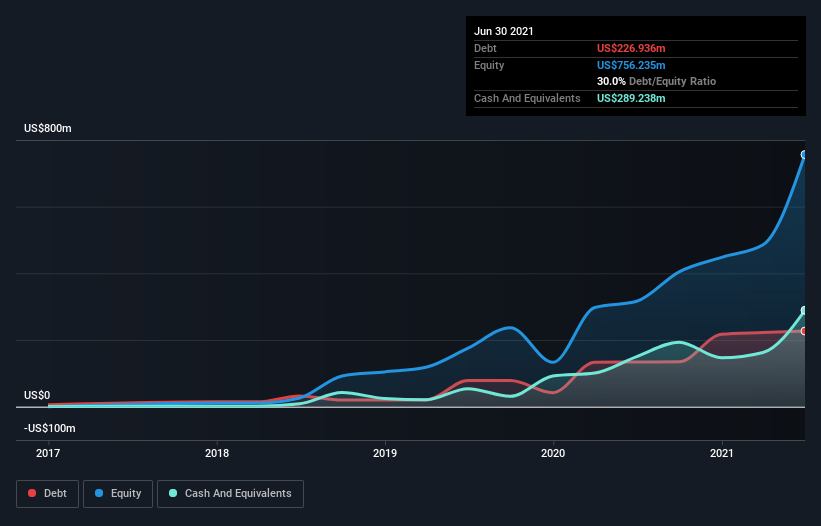
Some say volatility, rather than debt, is the best way to think about risk as an investor, but Warren Buffett famously said that 'Volatility is far from synonymous with risk.' When we think about how risky a company is, we always like to look at its use of debt, since debt overload can lead to ruin. As with many other companies Trulieve Cannabis Corp. (CSE:TRUL) makes use of debt. But the real question is whether this debt is making the company risky.
Why Does Debt Bring Risk?
Debt is a tool to help businesses grow, but if a business is incapable of paying off its lenders, then it exists at their mercy. If things get really bad, the lenders can take control of the business. However, a more common (but still painful) scenario is that it has to raise new equity capital at a low price, thus permanently diluting shareholders. Of course, debt can be an important tool in businesses, particularly capital heavy businesses. When we examine debt levels, we first consider both cash and debt levels, together.
Check out our latest analysis for Trulieve Cannabis
What Is Trulieve Cannabis's Net Debt?
As you can see below, at the end of June 2021, Trulieve Cannabis had US$226.9m of debt, up from US$133.9m a year ago. Click the image for more detail. However, its balance sheet shows it holds US$289.2m in cash, so it actually has US$62.3m net cash.

How Strong Is Trulieve Cannabis' Balance Sheet?
Zooming in on the latest balance sheet data, we can see that Trulieve Cannabis had liabilities of US$76.7m due within 12 months and liabilities of US$313.3m due beyond that. On the other hand, it had cash of US$289.2m and US$11.9m worth of receivables due within a year. So its liabilities outweigh the sum of its cash and (near-term) receivables by US$88.9m.
Since publicly traded Trulieve Cannabis shares are worth a total of US$3.85b, it seems unlikely that this level of liabilities would be a major threat. Having said that, it's clear that we should continue to monitor its balance sheet, lest it change for the worse. While it does have liabilities worth noting, Trulieve Cannabis also has more cash than debt, so we're pretty confident it can manage its debt safely.
Better yet, Trulieve Cannabis grew its EBIT by 200% last year, which is an impressive improvement. That boost will make it even easier to pay down debt going forward. There's no doubt that we learn most about debt from the balance sheet. But it is future earnings, more than anything, that will determine Trulieve Cannabis's ability to maintain a healthy balance sheet going forward. So if you're focused on the future you can check out this free report showing analyst profit forecasts.
Finally, a company can only pay off debt with cold hard cash, not accounting profits. While Trulieve Cannabis has net cash on its balance sheet, it's still worth taking a look at its ability to convert earnings before interest and tax (EBIT) to free cash flow, to help us understand how quickly it is building (or eroding) that cash balance. Over the last three years, Trulieve Cannabis saw substantial negative free cash flow, in total. While investors are no doubt expecting a reversal of that situation in due course, it clearly does mean its use of debt is more risky.
Summing up
While it is always sensible to look at a company's total liabilities, it is very reassuring that Trulieve Cannabis has US$62.3m in net cash. And it impressed us with its EBIT growth of 200% over the last year. So we are not troubled with Trulieve Cannabis's debt use. The balance sheet is clearly the area to focus on when you are analysing debt. However, not all investment risk resides within the balance sheet - far from it. To that end, you should learn about the 3 warning signs we've spotted with Trulieve Cannabis (including 1 which doesn't sit too well with us) .
If, after all that, you're more interested in a fast growing company with a rock-solid balance sheet, then check out our list of net cash growth stocks without delay.
If you’re looking to trade a wide range of investments, open an account with the lowest-cost* platform trusted by professionals, Interactive Brokers. Their clients from over 200 countries and territories trade stocks, options, futures, forex, bonds and funds worldwide from a single integrated account. Promoted
Valuation is complex, but we're here to simplify it.
Discover if Trulieve Cannabis might be undervalued or overvalued with our detailed analysis, featuring fair value estimates, potential risks, dividends, insider trades, and its financial condition.
Access Free AnalysisThis article by Simply Wall St is general in nature. We provide commentary based on historical data and analyst forecasts only using an unbiased methodology and our articles are not intended to be financial advice. It does not constitute a recommendation to buy or sell any stock, and does not take account of your objectives, or your financial situation. We aim to bring you long-term focused analysis driven by fundamental data. Note that our analysis may not factor in the latest price-sensitive company announcements or qualitative material. Simply Wall St has no position in any stocks mentioned.
*Interactive Brokers Rated Lowest Cost Broker by StockBrokers.com Annual Online Review 2020
Have feedback on this article? Concerned about the content? Get in touch with us directly. Alternatively, email editorial-team (at) simplywallst.com.
About CNSX:TRUL
Good value with adequate balance sheet.

